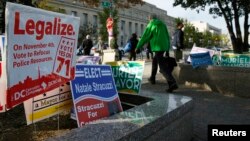The debate over the legalization of marijuana in the United States is now centering on the nation’s capital — both in the halls of Congress and on the streets surrounding it.
District of Columbia residents voted last November to legalize the drug, but Congress put language in its budget to block funding for its regulation, setting up a host of challenges.
Despite the congressional move, the new D.C. law, which took effect on Thursday, allows anyone over 21 to possess up to two ounces (56 grams) of marijuana and to grow up to six plants in their home, three of them mature. Sales are barred but transfers of up to one ounce (28 grams) are legal, and it remains illegal to smoke and consume in public. The drug is barred in about 20 percent of the city that is federal land.
Backers of the new law are celebrating.
“Prohibition has failed,” said Malik Burnett, Policy Manager for the Drug Policy Alliance, which promotes liberalizing the country’s drug regulations.
But some in Congress vow to use their power to block implementation.
Republican Congressman Jason Chaffetz, who chairs the House Oversight Committee, warned D.C. Mayor Muriel Bowser that she and other city officials could go to jail.
Bowser said the measure would take effect as planned.
"Bullying the District of Columbia is not what [Chaffetz's] constituents expect, nor do ours," she told reporters. "We do disagree on a matter of law. There are reasonable ways to resolve this without us threatening him or he us."
Still, laws on the books complicate the matter and will likely leave some users in a legal quandary.
Federal law classifies marijuana as an illegal substance and anyone possessing it is subject to arrest. In Washington, it is a criminal offense to possess marijuana on federal property — from parks and monuments to government buildings.
David Grasso, a member the district’s legislative branch, is concerned people carrying marijuana may not even realize they are on federal land.
“You [could have] people walking down the street not knowing what the law is from one block to the next,” he said.
Opponents in Congress, led by Rep. Andy Harris, a Maryland Republican, attached a provision to the congressional budget bill prohibiting the D.C. government from spending "any local money on the regulation of marijuana," Grasso said. “So we were prohibited by Congress from spending our own money on the implementation of marijuana regulations.”
Under the U.S. Constitution, Congress has jurisdiction over the District of Columbia and can override local laws.
In a statement, Rep. Harris said “any movement to legalize marijuana in D.C. is a willful violation of the [federal] law.”
But not having tightly regulated controls has left a loophole of uncertainty, according to Grasso.
“How are you going to get marijuana if you don’t grow it?” he asked. “You’re going to have to buy it from somebody. You really don’t eliminate the underground market.”
Grasso believes recreational marijuana should be regulated by the same federal bureau that controls alcohol sales. In January, he introduced a bill to tax and regulate marijuana in D.C., which he admits goes against the congressional order.
Under the current law, the city can neither tax nor regulate the drug — steps congress explicitly forbade.
“We should do that right away in spite of Congress,” he said.
Grasso foresees a day when there would be “independent marijuana retail stores,” and perhaps restaurants “where they would cook with it.”
“People should be able to go to the store and purchase it, just like they purchase groceries,” Burnett said, adding that he favors private cannabis clubs where pot can be exchanged.
But Mayor Bowser is seeking to restrict those clubs since the D.C law prohibits using marijuana in restaurants and bars.
Debates over the implementation of marijuana regulation is going on in several parts of the country. Rules similar to those outlined in the D.C. law took effect Tuesday in Alaska, and Colorado and Washington state already have legal marijuana. Oregon is poised for July 2015 legalization.
Polls indicate the majority of Americans support marijuana legalization.
Internationally, only North Korea, Uruguay and the Netherlands have legalized marijuana, while others have decriminalized the drug, or at least tolerate its use, especially in places where it has commonly been smoked.
